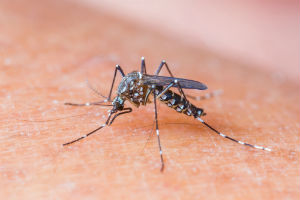How Much Should We Fear Dengue?
Oct 11, 2019, 11 28 | Updated: Jul 18, 2023, 16 40
Poor levels of sanitation over the recent few months have resulted in the rate of dengue rising sky high in Bangalore. Some strains are potentially fatal. How Much Should We Fear Dengue? Doctors in the city speak to us.
Across the city, almost everyone has a dengue anecdote, a friend who was hospitalised or a colleague absent for a long stretch from work.
In recent days, the number of cases of dengue in the city has been increasing. So many have been hospitalised, afflicted by the dreaded dengue virus, that even the (largely uncaring) local government saw fit to erect two hoardings on the old Airport Road, advising the public on how to address the problem.
According to the Health and Family Welfare Department, this year there have been 2,289 diagnosed cases of dengue in Karnataka out of which 302 are from Bangalore.
While everyone knows of the existence of dengue, few have a clear sense of what it is and more importantly, what to do about it. Fewer still have more than a rumour-fuelled sense of the situation in the general disquiet of the city about the virus.
So we asked medical professionals in the city about how bad the situation is and if dengue has reached epidemic proportions. We also checked to see what one could do about it and if it can be prevented or avoided.
The good news is that while dengue has not reached the status of being an epidemic, the not so good news is that the only way to avoid getting dengue is to avoid being bitten by a dengue-carrying mosquito.
Is there a dengue epidemic in the city?
Dr Sitaram Chowti, General Physician of Mallya Hospital, would not go so far as to deem the situation an epidemic. “Epidemic is too strong a word. I definitely wouldn’t call it that. However, I would say that it's rampant” he said.
Dr Preeti Galgali, a consultant paediatrician and Central Executive board member for the Indian Academy of Paediatricians, was slightly unsure about dengue becoming an epidemic but did share Dr Chowti’s views on the disease, “I won't be able to say that for sure as one needs to go through statistics and data to determine whether it is an epidemic. But there have more cases of dengue reported than last year. We're getting a number of cases where children as young as 7- to 8-months old are suffering from dengue. In that age, it’s serious.
What is Dengue?
Dengue (also known as Breakbone Fever) is a common viral infection spread by mosquitoes. Symptoms include high temperature (fever), headache, pain behind the eyes and bone, muscle and joint pain.
How do you get dengue?
Dengue happens when an infected mosquito (the Aedes aegypti / Aedes albopictus) bites a human. Any mosquito that bites this human then becomes an infected mosquito and is of danger to anyone it might then bite.
Is it contagious?
No. You can only get it from mosquito bites.
Where does it flourish?
Dengue is widespread in areas of the world with a high mosquito population, typically areas that have a warm and humid climate and overcrowding. The Aedes mosquito prefers to breed near water and is often found in stagnant water containers around building sites in urban environments. Poor levels of sanitation over the recent few months have resulted in the rate of Dengue rising high in Bangalore.
In response to the titled question, "How Much Should We Fear Dengue?", Dr Preeti Galgali blamed the poor civic conditions in the city. She said, “The primary reason for that is the increasing garbage situation in the city combined with rains.”
How do you know you have dengue?
Dr Galgali explained the basics, “This disease closely mimics viral fever but symptoms that help us to diagnose Dengue are if there is incessant vomiting and irritability in the patient. With doctors it sometimes works more as a sixth sense to check for Dengue when patients with high fever spread over 3-4 days come.”
She added, “The fever is biphasic which means that the fever will subside after 2-3 days but will return in a day or two. This is one of the indications that it might be dengue. This disease is basically categorized in three forms – the more common and mild dengue, and the more lethal and serious ‘haemorrhagic dengue’ and the ‘dengue shock syndrome’, where there is leakage of blood from capillaries due to which there is fall in blood pressure. And when the blood pressure goes so low that it cannot sustain life. This is known as the capillary leak syndrome.”
Can you avoid getting dengue?
“It is actually very difficult to save oneself from mosquito bites. No matter how much one may try. But we can do things like avoiding stagnant water and maintaining a healthy environment,” Dr Chowti said.
All the medicos said that the best way to prevent catching the infection is to use common sense and avoid high-risk areas. This includes wearing protective clothing and using a mosquito repellent throughout the day and night.
The general consensus is that there are no specific medications to treat the disease, but symptoms can be managed with paracetamol, plenty of fluids and rest.
How Much Should We Fear Dengue? How dangerous can it be?
A small number of patients go on to develop a more serious form of the disease known as 'severe dengue', a potentially fatal complication that can lead to shock (a sudden drop in blood pressure), bleeding and organ damage. People who get this complication will need to be admitted to hospital.
Is there a cure?
No. There is currently no vaccine for dengue fever.
We also interviewed two doctors Dr Venkatesh and Dr Shobhana Devi from Lakeside Hospital and they provided us with a further breakdown of the disease.
Does the increase in Dengue fever outbreaks in Bangalore mean there are insufficient resources to control the disease?
Dr Venkatesh: We have sufficient resources to control the disease, but we have yet to implement them all.
Dr Shobhana Devi: Yes, indeed there are insufficient resources in the city. Also, the city scores very poorly when it comes to sanitation and hygiene.
At what point can the victim/ doctor determine the severity of the disease?
Dr V: The point when the patient starts bleeding from the nose, oral cavity and /or rectum. Also, Hematuria, severe tiredness with BP less than 80 systolic pressure, and excessive bleeding associated with the regular menstrual cycle. Dengue is associated with risk factors such as diabetes, high BP, respiratory problems such as pneumonia, acute asthma, congestive heart failure etc. These are the symptoms that determine the severity of the disease.
Dr S: After considering the clinical evaluation of the victim, a thorough blood examination is done. We particularly observe the platelet count to determine the severity of the disease.
What should we do to fight Dengue?
Dr V: By keeping our surroundings clean and spraying anti-mosquito liquid near garbage dumps and drainages. One also needs to avoid stagnant water. Use mosquito nets, mosquito repellents liquid or coils at home. If you have Dengue fever with low platelet counts with stable vitals then you can consume juice made from Papaya and Tulsi leaves -- It increases the platelet count and reduces the fever as well.
Dr S: Keep your surroundings clean by disposing garbage at marked points for its collection. Drink clean, boiled water. Proper methods should be used to store water. Basically, maintain hygiene so you can prevent mosquitoes from breeding.
How many cases of Dengue have you encountered over the past year?
Dr V: I have seen more than 50 cases.
Dr S: I have personally seen more than 100 cases.
Here are some precautionary measures suggested by nature.com and the doctors we interviewed:
Use mosquito repellent: Use mosquito repellent sprays that contain DEET (N,N-Diethyl-meta-toluamide, the most common active ingredient in insect repellents). Your pharmacist ought to pick out the right brands for you.
Isolate dengue patients for some time: Dengue patients should be kept under mosquito netting until the second bout of fever is over and they are no longer contagious, so they will not infect passing mosquitos.
Rid your surroundings of stagnant water: Cover overhead water tanks. This counts as stagnant water. Other potential pools of stagnant water are around unused plastic pools, old tires, buckets and clogged gutters.
(This article was published in July 2013.)







